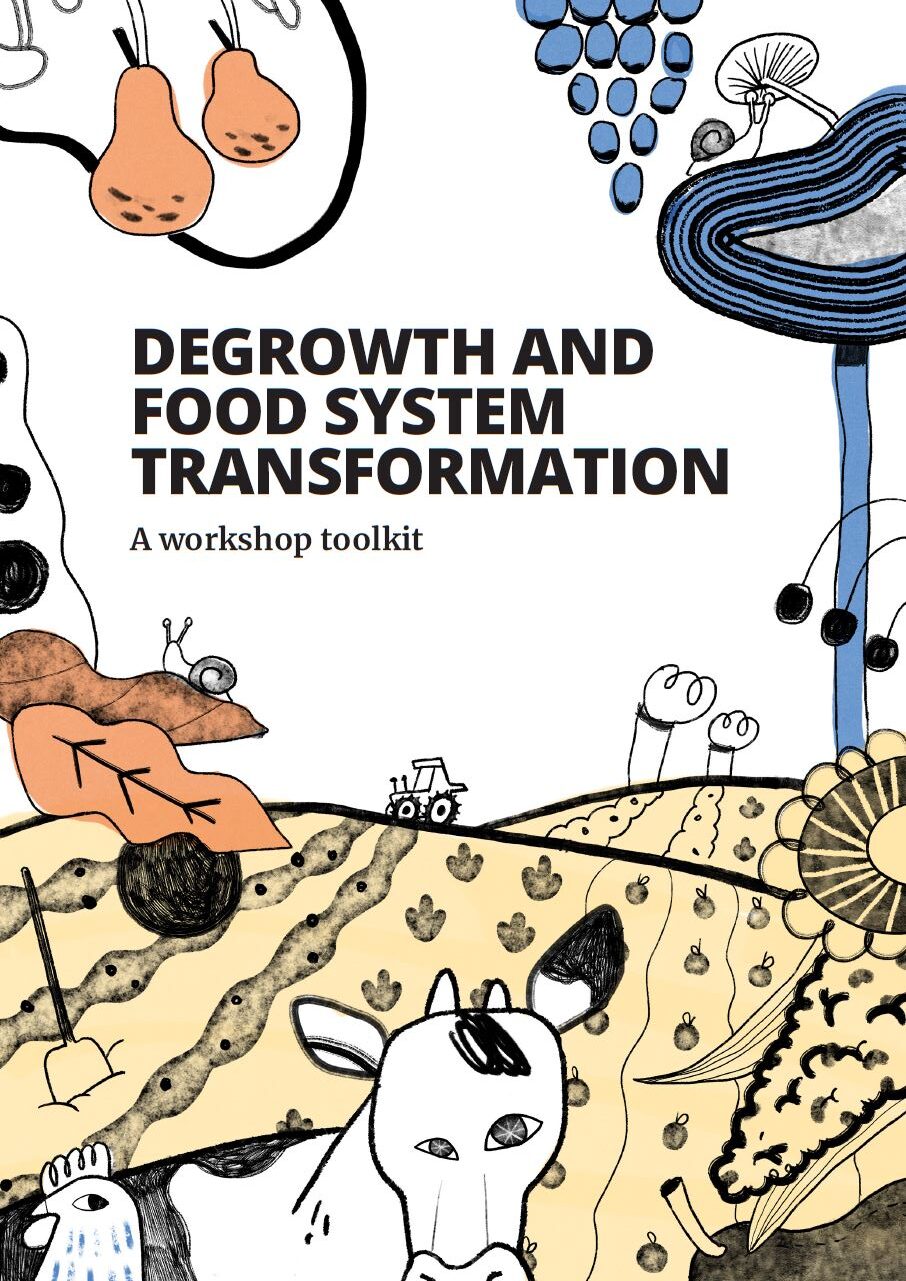By Julia Spanier, Jacob Smessaert, Leonie Guerrero Lara, Guilherme Raj and Laura van Oers
With the 9th International Degrowth Conference happening in Zagreb, Croatia, from August 29 to September 2, we introduce and share the workshop toolkit “Degrowth and Food System Transformation”, a workshop for everyone who wants to critically analyse capitalist food systems and strategize for pathways toward more just, autonomous, diverse and ecologically sound food systems.
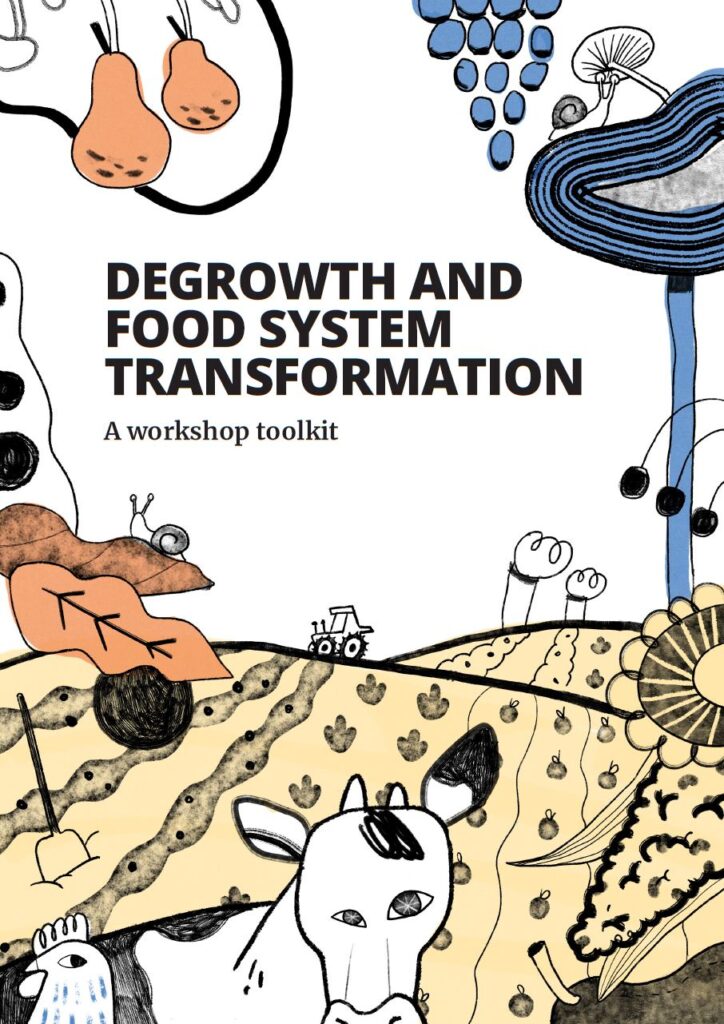
- Introduction
In a previous blogpost, we discussed in what ways degrowth theory can contribute valuable new perspectives to the enactment of food system transformation beyond capitalism. Informed by these reflections, we have developed a workshop on “Degrowth and Food System Transformation”, to identify what needs to be unmade and discarded in a transformation of our capitalist food systems, and the strategic interventions through which this could be made possible. We share a link to the toolkit (available in English and German) and all connected resources at the bottom of this blogpost.
The workshop starts from the premise that capitalist food systems are broken and unsustainable. They are dependent on cheap and abundant fossil fuels, on mineral fertilizers and chemical pesticides, on capital-intensive machinery and technologies, on unequal trade relations, and on the exploitation of nature and cheap labour around the world. Conventional agriculture, together with the ideology of endless economic growth that underpins it, is depleting natural resources, polluting freshwater sources, destroying forests and drastically changing the climate. Simultaneously, citizens are often disconnected from the food they eat. They do not know where their food comes from, how and by whom it has been produced, what the social conditions of agricultural workers are, and expect a wide variety of choice of cheap and fresh food all year long.
With this workshop, participants are encouraged to scrutinise the systemic links between food systems and growth-based economies. We believe this exercise allows for a more nuanced understanding of the processes at play in food system transformation, and for designing tactics and strategies that are appropriate for tackling the multifaceted crises we are facing.
This workshop toolkit is designed for everyone who wants to critically analyze capitalist food systems and strategize for pathways toward more just, sustainable, democratic, autonomous and diverse food systems. We have developed two versions of the workshop: one for persons who are discovering degrowth and its critiques of capitalism; another one for persons that are already knowledgeable about degrowth theories and debates and want to apply this knowledge to food systems. For the first group, we believe the workshop is useful in pointing to structural obstacles to transformation that are ingrained in capitalist institutions and values. For the second group, we propose a systematic approach for dealing with the different foundational institutions of capitalism (as well as their interconnections) and apply recent discussions on degrowth strategizing to the case of capitalist food systems. In what follows, we describe the toolkit in its more elaborate version, share our experience from holding and facilitating the workshop, and point to some reflections that emerged during and after the workshop.
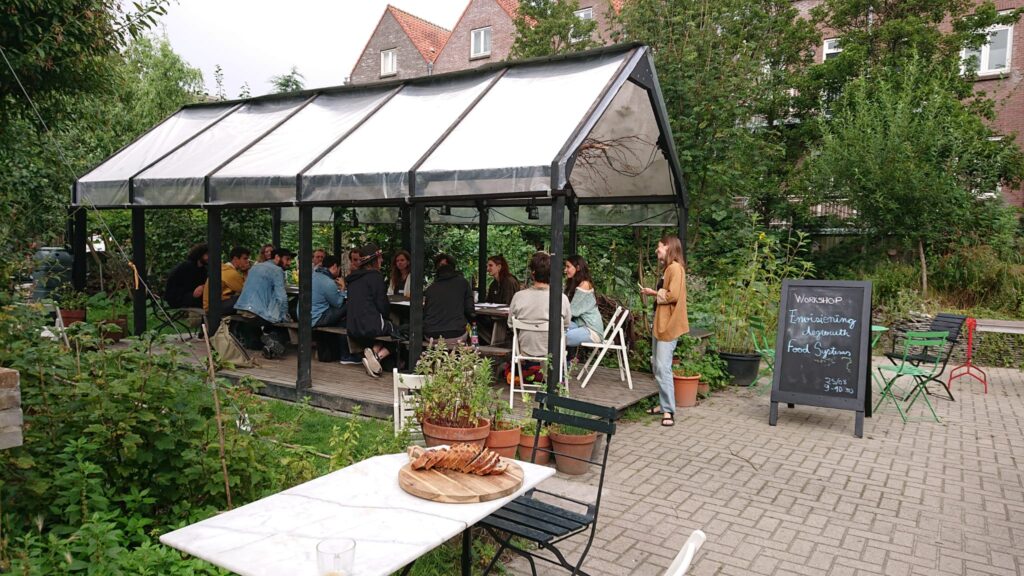
Organizing the workshop at the 2021 Degrowth Conference in The Hague. Source: Laura van Oers
- Description of the workshop toolkit
The workshop is composed of five blocks: an introduction, a visioning exercise, a short presentation of degrowth, a strategizing exercise on overcoming obstacles towards just and sustainable food systems, and a closing moment of reflection.
Introduction and Visioning
After a brief ice-breaker and establishing a group agreement for fruitful and respectful collaboration throughout the workshop, participants are invited, with the help of different prompting questions, to individually imagine how their desired food system could look in the future: where they imagine they will get their food from, how their food will be produced, and what they will feel, smell and taste. Subsequently, participants share their visions in small groups, followed by a plenary discussion about the core values and principles that underpin just, autonomous, diverse and ecologically sound food systems.
Presenting degrowth
Then, the workshop introduces and recaps degrowth as an explicit critique of the capitalist growth paradigm and (neo)colonial development model pursued by countries in the Global North that has profound consequences for countries in the Global South. Additionally, it presents degrowth as a call for nurturing specific practices and relationships for sustainable societies (solidarity, justice, cooperation, care, biodiversity, sufficiency). Importantly, this also includes wealth redistribution both in and between countries in the Global North and South.
The workshop toolkit also contains a more accessible version of the degrowth presentation that can be used with groups that have not been sensitized (or might initially be resistant) to anti-capitalist, feminist and decolonial critiques of contemporary societies. This presentation has a more introductory function and explains core critiques and proposals embedded in degrowth, such as the critique to national GDP as the main measure for well-being, modes of production and consumption based on planned obsolescence design of products and technologies, and debunking the myth that ‘green growth’ is ecologically feasible and socially desirable.
Strategizing and Conclusion
The core activity of the workshop consists of a group exercise in which participants form small groups and strategize how to achieve their envisioned food system by deliberately addressing obstacles that growth-based societies undeniably pose to radical social transformation. The toolkit provides several printable ‘obstacle cards’, each describing institutions of the capitalist growth society, such as efficiency, gendered and undervalued care work, individualism, private property or commodification. For each obstacle, the toolkit briefly describes how it conditions and perpetuates unsustainability and injustice and how it hinders transformation. Participants are asked to come up with strategic interventions to overcome these specific obstacles. At the end of the exercise, they present their designed strategies in a plenary discussion.
In the concluding stage of the workshop, a connection with transformations in other sectors is made to highlight that building environmentally sound and socially just food systems is fundamentally intertwined with systemic changes in other sectors of society, such as energy, transportation and housing.
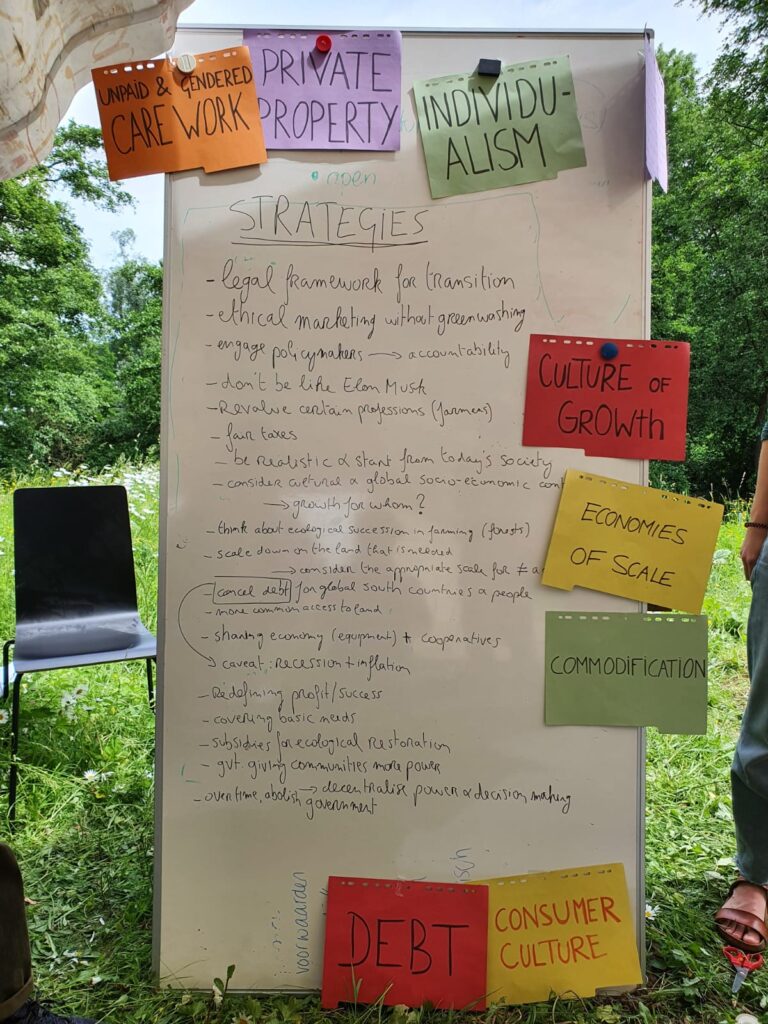
A compilation of strategies for degrowth food system transformations. Source: Tom Janssen.
- Some experiences from holding the workshop
So far, we have held the workshop twice in the Netherlands: at the Food Autonomy Festival in Utrecht (2021) and the Degrowth Conference in The Hague (2021). We have also discussed and received feedback on the workshop toolkit at several occasions within the German community-supported agriculture (CSA) network (2023). Upon the request of a German CSA initiative, we translated the workshop toolkit into German in May 2023.
The workshop toolkit was originally designed for an audience involved in or connected to alternative food initiatives, agroecology and food sovereignty movements, and who have an interest in exploring their struggles’ links to anti-capitalist and degrowth struggles. However, our experience with holding the workshop at the Degrowth Conference confirms that it can also be held well with a community identifying degrowth as their ‘homebase’ and food as their interest to explore in more depth. If every participant considers themselves an expert in degrowth, you might consider shortening or cutting the introduction to degrowth and adding extra information on food system transformation.
Participants who identified as part of the degrowth movement told us that the workshop was a good opportunity to reflect on their vision for a degrowth food system, and that they saw great use in strategizing against the capitalist growth economy by breaking it down into several institutions in need of disruption, rather than considering it as an untransformable monolith.
Since both workshops in Utrecht and The Hague attracted a largely activist community, the participants had quite aligning visions and values for their desired future food systems. For many, these futures revolved around local food systems (free from corporate control), agroecological farming practices and food cooperatives.
Strategizing pathways towards these desired food systems, the workshop participants brought in a great diversity of strategic interventions, ranging from massive land reforms to the expropriation and squatting of corporate farms, confederal networks of food cooperatives and regional food policy councils. Our collective discussion highlighted that achieving alternative food futures relies not only on proposing different ways of producing food or organising farming initiatives. It also needs the development of strategies to unmake, unlearn and abolish the values, institutions and paradigms that perpetuate social injustice and environmental destruction.
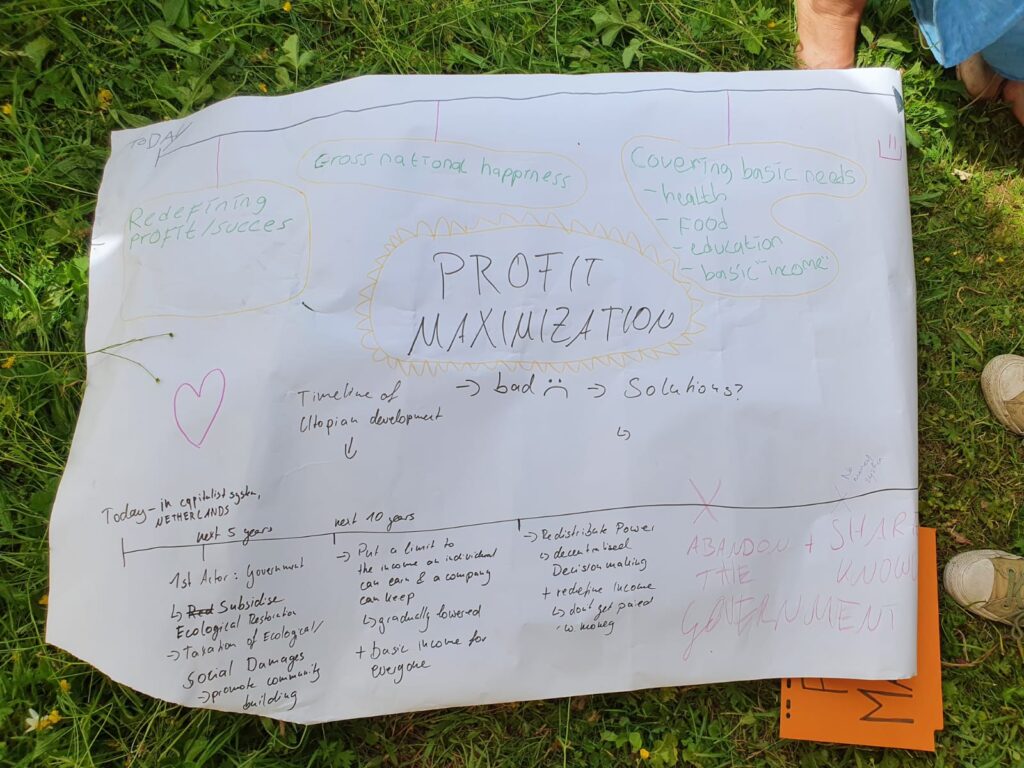
Strategizing to overcome profit maximization in the food system. Source: Tom Janssen
One of the key lessons from these two workshop sessions was the amount of time and reflection needed for all participants, including us as facilitators, to get into a flow of strategizing tactics and interventions for food system transformation. A key factor for the exercise to lead to concrete proposals was to focus the activity on a select element of the desired food future, and to one or two obstacles ingrained in our capitalist economy, rather than on a holistic pathway to ‘a sustainable and just food system’. For instance, participants in one workshop envisioned a future where ‘food will be mostly produced by smallholder farms’, and subsequently chose ‘commodification’ or ‘private property’ as obstacles to be overcome. Simply choosing what to focus on, and having a short conversation in the small groups about the meaning and materiality of the obstacle, takes time. Yet, we believe that gaining a collective understanding of these obstacles is very useful, and we would recommend taking enough time for this collective strategizing exercise.
- Links and resources
The workshop toolkit is freely available here. On the webpage of our research project (https://unmaking.sites.uu.nl/resources/) you find both versions in English and German, as well as all resources to help you hold the workshop (a PowerPoint presentation, printable ‘obstacle cards’, guiding questions). Please feel free to download, share, use and adapt the toolkit wherever you see fit, be it a weekly meeting of your local food cooperative, a strategizing workshop in your agroecology movement’s regional gathering, a degrowth festival or a skill-share at a climate camp. If you have any questions about the workshop, don’t hesitate to write us. If you have the opportunity to put the toolkit in practice, we’d be curious to hear what your experience was, and what changes you would suggest for improvement.
We hope this workshop can be a helpful tool, and especially a joyful activity, in our collective struggle towards just, autonomous, diverse and ecologically sound food systems. We see great value in envisioning emancipatory food futures, in naming some of the structural constraints our capitalist growth economy poses to these futures, in demystifying the obstacles by collectively analysing how they impede food system transformation in practice and in our lived experiences, and in thinking of specific strategies that could synergistically dismantle them.
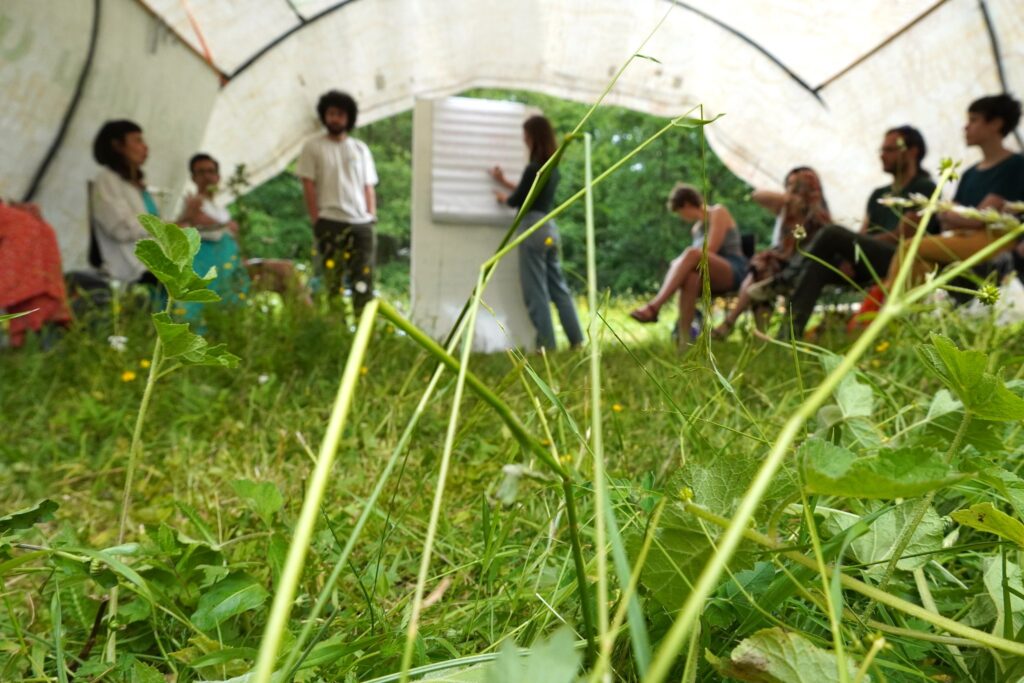
A grassroots perspective on strategizing for degrowth food systems. Source: ASEED
Julia Spanier, Jacob Smessaert, Leonie Guerrero Lara, Guilherme Raj and Laura van Oers are PhD researchers at Utrecht University, the Netherlands. As part of the UNMAKING research project, they study the dismantling of capitalist institutions in agricultural grassroots movements. Their focus lies on radical food system transformations in Europe. For questions or feedback about the workshop, please reach out to Julia ([email protected]).


